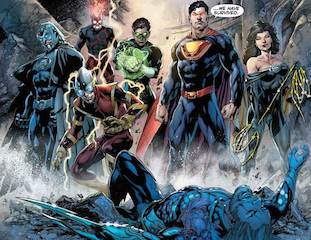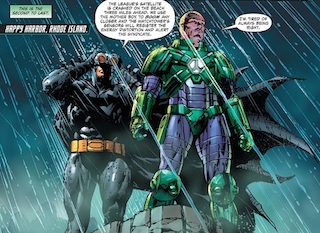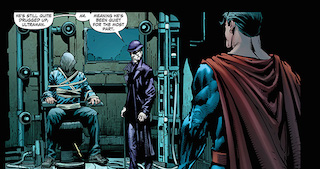![]() Forever Evil by Geoff Johns
Forever Evil by Geoff Johns
 Two years into the New 52 and DC has managed to divide fans down the middle: Just as many seem to hate the New 52 as love the new possibilities it offers as a “soft reboot” (Jim Lee) to the DC universe. However, the excited buzz in the comic book stores as they launched into their first event, Trinity War, died out as the second half seemed to fizzle after the great promise of the first few issues. However, Trinity War paved the way for Forever Evil, perhaps the first true event of DC’s New 52 if we consider Trinity War a prologue to Forever Evil. That’s probably how Trinity War eventually will be remembered. Forever Evil takes all the promise of Trinity War and the New 52 reboot and shows us what can really be done in this new universe. DC seems to have finally come up with a successful, major event that satisfies almost all the fans. I’ve yet to hear a complaint about it. Nobody is surprised that Forever Evil ‘s brilliance is due to writer Geoff Johns, the genius behind the greatest run on Green Lantern and the recent run on Aquaman. Johns seems to be capable of no wrong these days.
Two years into the New 52 and DC has managed to divide fans down the middle: Just as many seem to hate the New 52 as love the new possibilities it offers as a “soft reboot” (Jim Lee) to the DC universe. However, the excited buzz in the comic book stores as they launched into their first event, Trinity War, died out as the second half seemed to fizzle after the great promise of the first few issues. However, Trinity War paved the way for Forever Evil, perhaps the first true event of DC’s New 52 if we consider Trinity War a prologue to Forever Evil. That’s probably how Trinity War eventually will be remembered. Forever Evil takes all the promise of Trinity War and the New 52 reboot and shows us what can really be done in this new universe. DC seems to have finally come up with a successful, major event that satisfies almost all the fans. I’ve yet to hear a complaint about it. Nobody is surprised that Forever Evil ‘s brilliance is due to writer Geoff Johns, the genius behind the greatest run on Green Lantern and the recent run on Aquaman. Johns seems to be capable of no wrong these days.
 Forever Evil is about the Crime Syndicate, an evil version of the Justice League, coming to our world (what DC calls Earth Prime) from their world (called Earth-3). They arrive at the end of Trinity War, so you might want to read that collection first. However Forever Evil can be read alone. The members of the Crime Syndicate are Ultraman, Superwoman, Owlman (with Alfred), Johnny Quick, Power Ring, Deathstorm, Sea King, and one secret member I won’t mention by name. They also arrive with a hooded prisoner. The Crime Syndicate adds one more member to their perverse injustice league: Cyborg’s artificial body separates from him to form Grid, a sentient non-human being. They then kill the Justice League and recruit all the villains, all the rogues, throughout the DC universe to help them in taking over our world.
Forever Evil is about the Crime Syndicate, an evil version of the Justice League, coming to our world (what DC calls Earth Prime) from their world (called Earth-3). They arrive at the end of Trinity War, so you might want to read that collection first. However Forever Evil can be read alone. The members of the Crime Syndicate are Ultraman, Superwoman, Owlman (with Alfred), Johnny Quick, Power Ring, Deathstorm, Sea King, and one secret member I won’t mention by name. They also arrive with a hooded prisoner. The Crime Syndicate adds one more member to their perverse injustice league: Cyborg’s artificial body separates from him to form Grid, a sentient non-human being. They then kill the Justice League and recruit all the villains, all the rogues, throughout the DC universe to help them in taking over our world.
I won’t reveal how the Justice League is killed, or how they come back (of course they come back), but it’s well done. But that they are “killed” and brought back is not really the goal of the series. Narratively, the entire point is to get the usual heroes out of the picture so that the Crime Syndicate can be taken down by an unusual grouping of “heroes” for the duration of the story. The lead character, the head of this temporary team, is Lex Luthor who gives first-person narration at the beginning of most issues in the mini-series and at various points throughout the issues. I love that we get the story from his perspective. We also get a chance  to watch him develop from the first issue to the last. He does not remain the same. The rest of the group is extremely eclectic: Captain Cold, a Flash villain; Bizarro, whose creation story is excellent; Black Manta, an Aquaman villain; Black Adam, an evil, super-powered dictator; and even Sinestro, the ultimate Green Lantern gone bad. Finally, and this is a bit of a spoiler, but I want to explain how fascinating this group is, Batman has managed to survive, and he joins them along with Catwoman, with whom he seems to have grown particularly close. Together, they take on the Crime Syndicate, with Batman forced to take orders from Lex Luthor.
to watch him develop from the first issue to the last. He does not remain the same. The rest of the group is extremely eclectic: Captain Cold, a Flash villain; Bizarro, whose creation story is excellent; Black Manta, an Aquaman villain; Black Adam, an evil, super-powered dictator; and even Sinestro, the ultimate Green Lantern gone bad. Finally, and this is a bit of a spoiler, but I want to explain how fascinating this group is, Batman has managed to survive, and he joins them along with Catwoman, with whom he seems to have grown particularly close. Together, they take on the Crime Syndicate, with Batman forced to take orders from Lex Luthor.
There is too much to discuss in a single review. I need a full article to explicate this work of genius that is well-written and fun and unpredictable. This is a story where things actually happen: members of the Crime Syndicate die, and not even all the members of Lex Luthor’s team survive. The Crime Syndicate has revealed Nightwing’s identity to the world. The hooded prisoner is a key character with an opposite on Earth Prime (actually a combination of two key characters from Earth Prime), and when he is released, all the dynamics in play get shifted dramatically. We even find out that the Crime Syndicate is fleeing some destructive cosmic force that destroyed their world. If the Crime Syndicate is afraid of something or someone, it’s got to be bad. But what is it? Darkseid? Or something new to the New 52? You’ll have to wait to the final page of the book to find out.
 There’s much to like about this series, but what makes it so good is that the art is solid and the writing of the finest quality. I’ll give you an example from Lex Luthor’s narration. He’s thinking about why the Crime Syndicate has been so successful. Johns is very true to Luthor’s character by having Luthor, instead of blame the actual Crime Syndicate, find fault with the Justice League itself, particularly Superman: “I spent years warning congress, the people of Metropolis and Superman himself that our over reliance on him would not only leave humans stagnant, but vulnerable. We stopped trying to solve our own problems and instead looked up into the sky . . . staring at those bright colors. That’s why the world is doomed.” Luthor has always celebrated the greatness of humankind, and to him, our reliance on an alien leads us to mediocrity. Johns is true to every character in this book, as he is to Luthor here, and even the perverse versions of the Justice League give us greater understanding, via opposition, of the characters we know so well, from Batman to Green Lantern.
There’s much to like about this series, but what makes it so good is that the art is solid and the writing of the finest quality. I’ll give you an example from Lex Luthor’s narration. He’s thinking about why the Crime Syndicate has been so successful. Johns is very true to Luthor’s character by having Luthor, instead of blame the actual Crime Syndicate, find fault with the Justice League itself, particularly Superman: “I spent years warning congress, the people of Metropolis and Superman himself that our over reliance on him would not only leave humans stagnant, but vulnerable. We stopped trying to solve our own problems and instead looked up into the sky . . . staring at those bright colors. That’s why the world is doomed.” Luthor has always celebrated the greatness of humankind, and to him, our reliance on an alien leads us to mediocrity. Johns is true to every character in this book, as he is to Luthor here, and even the perverse versions of the Justice League give us greater understanding, via opposition, of the characters we know so well, from Batman to Green Lantern.
 Forever Evil is perhaps the one book you should get if you’re interested in trying out the New 52 for the first time. You don’t need to have read any other comic books before this one to enjoy it. If you want to pick up a few other excellent New 52 titles, give Batman, Batman and Robin, Wonder Woman, Batwoman, and Aquaman a try as well. And of course read Green Lantern up to issue #20, the final issue in Geoff Johns’s brilliant run. Now that we are two years into the New 52, we have some perspective on what is good and what is bad. And though there are many other good series I haven’t mentioned, I think if you read the titles listed above along with Forever Evil, you’ll be pleasantly surprised if you’ve heard people complaining about DC’s New 52. If you’re one of those fans who have been defending the New 52, Forever Evil is all the support you need for that defense.
Forever Evil is perhaps the one book you should get if you’re interested in trying out the New 52 for the first time. You don’t need to have read any other comic books before this one to enjoy it. If you want to pick up a few other excellent New 52 titles, give Batman, Batman and Robin, Wonder Woman, Batwoman, and Aquaman a try as well. And of course read Green Lantern up to issue #20, the final issue in Geoff Johns’s brilliant run. Now that we are two years into the New 52, we have some perspective on what is good and what is bad. And though there are many other good series I haven’t mentioned, I think if you read the titles listed above along with Forever Evil, you’ll be pleasantly surprised if you’ve heard people complaining about DC’s New 52. If you’re one of those fans who have been defending the New 52, Forever Evil is all the support you need for that defense.



Great review, Brad. I’m one of those who found The Trinity War underwhelming, but as you say, I’ve enjoyed what I’ve read of Forever Evil.
Thanks, Tim!